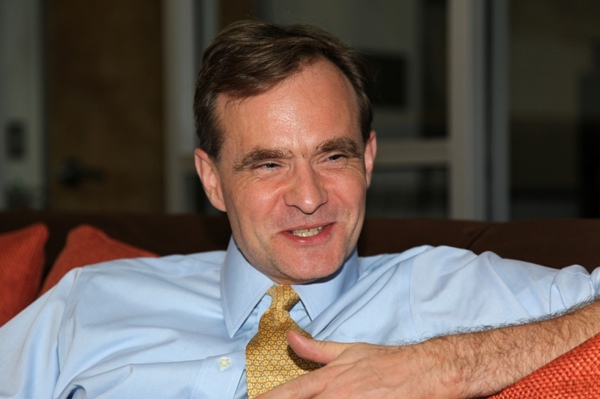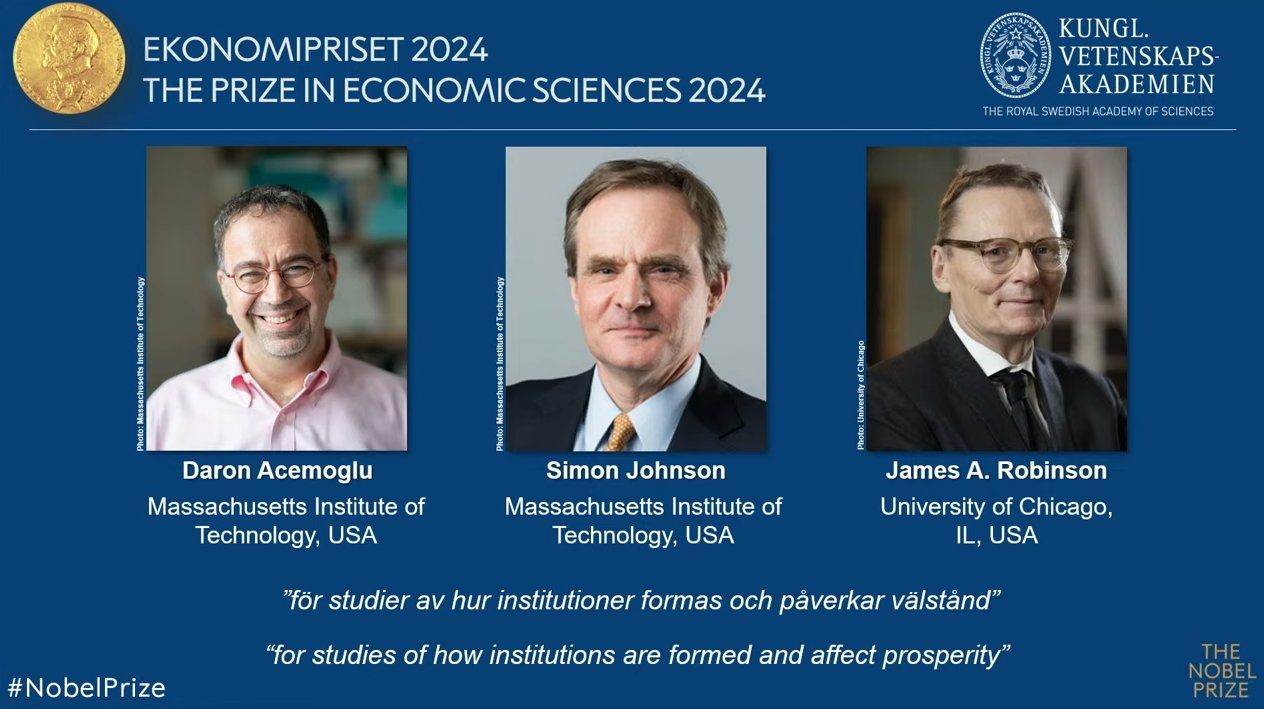The Nobel Prize in Economics for 2024 has been awarded to Daron Acemoglu, Simon Johnson, and James A. Robinson for their groundbreaking research on how political institutions are formed and their profound effects on economic prosperity.
Their work, which has reshaped how we understand economic development, highlights the importance of inclusive institutions and the role they play in shaping the wealth and stability of nations.
Through their extensive research, the laureates have provided a powerful framework for understanding the relationship between political power, resource allocation, and long-term economic outcomes.
The Power of Institutions in Shaping Economic Development
The central theme of Acemoglu, Johnson, and Robinson’s work is the role that institutions play in determining economic growth and prosperity. Their research argues that inclusive institutions, which provide broad participation in economic and political life, are essential for sustained economic development.
By contrast, extractive institutions, which concentrate power and wealth in the hands of a few, tend to stifle growth and lead to economic stagnation. Their studies have shown that institutions are not just economic or legal constructs but are deeply embedded in the political dynamics of a society.
Read : South Korean Author Han Kang Wins Nobel Prize in Literature
The balance of power between the elite and the masses, and the ways in which this power is exercised, are key factors in determining the trajectory of a nation’s development. According to their model, the distribution of political power directly influences the creation of institutions, which in turn affects economic outcomes.
Acemoglu, Johnson, and Robinson’s research has provided a framework for understanding how institutions evolve, why they sometimes fail, and what conditions are necessary for their reform. Their work emphasizes the importance of political agency and the ability of citizens to influence their institutions, often through collective action and mobilization.
The Three Components of Institutional Formation
A central element of the laureates’ work is their model of institutional formation, which consists of three key components. The first is the conflict between the elite and the masses over resource allocation and decision-making power.
In many societies, the elite holds the reins of power, controlling resources and making decisions that benefit their interests. The masses, on the other hand, often find themselves excluded from this decision-making process, leading to disparities in wealth and opportunities.

The second component is the ability of the masses to mobilize and challenge the power of the elite. This is a critical factor in bringing about institutional change. When the masses organize and demand greater representation or access to resources, they can shift the balance of power in their favor. This dynamic of power struggles and social movements is a key element in the creation of inclusive institutions.
The third component is what the laureates refer to as the “commitment problem.” In situations where the masses succeed in mobilizing and challenging the elite, the elite often face a dilemma. They can either retain their hold on power, risking further conflict and instability, or they can relinquish some of their control and share decision-making power with the populace.
The commitment problem arises because the elite cannot easily guarantee that they will stick to their promises of reform, leading to further tensions and instability.
This model has profound implications for understanding how institutions evolve and why some societies manage to build inclusive political and economic systems, while others remain mired in inequality and poverty.
Daron Acemoglu: Pioneering the Study of Institutions
Daron Acemoglu is a leading economist who has made significant contributions to our understanding of political economy and institutions. Born in Turkey and educated in the United States, Acemoglu is a professor of economics at the Massachusetts Institute of Technology (MIT).
His research focuses on the role of institutions in shaping economic development, and he is known for his ability to bridge economic theory with real-world applications.

One of Daron Acemoglu’s most influential works is the book Why Nations Fail, co-authored with James A. Robinson. In this book, Acemoglu argues that the success or failure of nations can largely be explained by the quality of their institutions.
Countries with inclusive institutions, which provide opportunities for participation and ensure a level playing field, tend to thrive. By contrast, nations with extractive institutions, where power and resources are concentrated in the hands of a few, are more likely to experience economic stagnation.
Acemoglu’s research has been instrumental in shaping policy debates about economic development, governance, and the importance of inclusive political institutions. His work has had a wide-ranging impact, influencing scholars, policymakers, and international organizations seeking to promote development and reduce inequality.
Simon Johnson: Economic Growth and Institutional Reform
Simon Johnson, a professor at MIT Sloan School of Management, has built a distinguished career in studying economic development and the role of institutions. Johnson’s research emphasizes the importance of institutional reform in fostering sustainable economic growth. He has also examined the impact of financial crises on emerging markets, providing key insights into how institutional weakness can exacerbate economic instability.

Johnson’s work with Acemoglu and Robinson has focused on the intersection of political economy and economic development, examining how power dynamics within societies affect the creation of institutions.
One of Johnson’s key contributions has been his research on the economic impact of colonialism, which has demonstrated how historical institutions set up during the colonial era continue to affect the development trajectories of nations today.
In addition to his academic work, Johnson has served in influential roles within international organizations, including the International Monetary Fund (IMF), where he worked as chief economist.
His experience in policy-making circles has helped to bridge the gap between academic research and practical policy solutions, particularly in the areas of institutional reform and financial stability.
James A. Robinson: The Political Economy of Development
James A. Robinson is a political scientist and economist whose work has focused on the political economy of development. Robinson is currently the director of The Pearson Institute for the Study and Resolution of Global Conflicts at the University of Chicago. His research has explored how political institutions shape economic outcomes, with a particular emphasis on how power struggles within societies influence institutional change.
Robinson’s collaboration with Acemoglu has produced some of the most influential work in political economy, including Why Nations Fail and The Narrow Corridor.
In these works, Robinson and Acemoglu argue that inclusive political institutions are crucial for economic development, as they allow for broad participation and prevent the concentration of power in the hands of a small elite.

Robinson’s research has also examined the role of violence and conflict in shaping political institutions, particularly in fragile and conflict-affected states.
Robinson’s work is notable for its interdisciplinary approach, drawing on insights from history, political science, and economics to provide a comprehensive understanding of institutional dynamics. His research has had a significant impact on debates about governance, development, and conflict resolution, making him a key figure in the study of political economy.
The Legacy of Acemoglu, Johnson, and Robinson’s Work
The work of Daron Acemoglu, Simon Johnson, and James Robinson has had a profound impact on our understanding of economic development and the role of institutions. Their research has shown that institutions are not static entities, but are shaped by the ongoing power struggles within societies.
By focusing on the ways in which political power is distributed and exercised, the laureates have provided a powerful framework for understanding how institutions evolve and why some countries succeed in building inclusive, prosperous societies, while others do not.
One of the key insights from their work is that economic development is not simply a matter of implementing the right policies or investing in infrastructure. Rather, it requires a deeper understanding of the political dynamics that shape institutions and determine whether they are inclusive or extractive.
Their research has emphasized the importance of political agency and the ability of citizens to influence their institutions through collective action and mobilization.

As recipients of the 2024 Nobel Prize in Economics, Acemoglu, Johnson, and Robinson join a prestigious group of scholars whose work has advanced our understanding of economic development and the role of institutions. Their contributions will continue to shape debates about governance, inequality, and economic growth for years to come.
The awarding of the Nobel Prize in Economics to Daron Acemoglu, Simon Johnson, and James A. Robinson highlights the importance of institutions in shaping economic prosperity.
Their research has provided a new lens through which to understand the political and economic forces that drive development, offering valuable insights into how inclusive institutions can promote sustained growth and equality.
Through their pioneering work, the laureates have made a lasting contribution to the field of economics and have influenced how we think about governance, development, and the role of institutions in creating a prosperous society.

